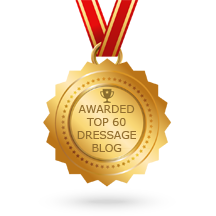[Guest Blog] Does Your Horse Need Equine Massage Therapy?
Some signs that your horse could use a massage when medical issues or trauma have been ruled out include:
● head tossing
● rearing
● bucking
● kicking
● balking (refusing to go or to jump)
● "cold backing" (caving in the back when a blanket or saddle is placed on it)
● resisting the bit
● girthing problems
● "sticking" during certain moves or in certain directions
● bobbing the head
● stall vices, like cribbing
● refusing to pick up the feet
● difficulty collecting
● general crankiness or irritability, especially if new
Equine massage is also a great remedy for known injuries with a horse or residual pain from old trauma and poorly fitted saddles. It may also be appropriate under your veterinarian's supervision for horses recovering from colic or tying up ("Monday Morning Disease") and help give you the best odds for full recovery.
If you're not familiar with equine massage therapy, it's a complementary modality that works in concert with the horse's own body to help speed rehabilitation from surgery, catastrophic injury and minor wear and tear such as from heavy workouts. The more athletically competitive or active your horse is, the more it likely needs a good regular massage. Equine massage can be performed on virtually any horse engaged in any riding discipline.
There are many varieties of equine massage taught by accredited programs, but most of them are similar in that they provide a full-body, poll-to-tail rub for the horse. It works out kinks and stiffness and restores or even increases range of motion. For healthy competitors, massage keeps them supple and comfortable, and for injured horses, it speeds recovery. In some horses, equine massage therapy can actually improve performance.
Equine massage works by a number of mechanisms. It speeds circulation, which brings healing cells to injured or overused areas (like those with lots of lactic acid from heavy workouts) and helps eliminate toxins. It can reduce swelling and knots that are associated with spasms and provide gentle stretching in the joints.
Massage also helps the horse's body release endorphins, which are natural hormones that help block pain. Horses often create pain feedback loops in their bodies, where they hold tension (often in the neck) when they feel pain. The place where they are storing all that tension then becomes painful, and the loop begins. By encouraging endorphin production, equine massage can significantly help improve the mood of horses that are ornery or disinterested due to discomfort.
The increase in circulation can be great to get digestion moving again after an episode of colic and to release tight muscles when a horse ties up. You should get your veterinarian's okay for a massage with these conditions, as with a pregnant mare or horse suffering from founder/laminitis. Equine massage cannot be performed on horses with contagious skin conditions or malignancies that could spread more rapidly through the bloodstream as a result of massage.
If you think your horse could benefit from a massage, you should talk to some equine massage therapists in your area to arrange a trial session. Whether you want to give your horse the best odds at a national competition or simply improve their odds of recovering from a trail injury, equine massage therapy may be just the perfect treatment.
This article was written by John Hawthorne who is a sports and travel writer from Canada. When he is not researching his next destination he write for various websites such as
www.odds.com.au.


![[Guest Blog] Does Your Horse Need Equine Massage Therapy?](https://blogger.googleusercontent.com/img/b/R29vZ2xl/AVvXsEjskScHQxrO-rl4mTvr3jDPXGlAtfAltCamu4H2qmg6t2u_eZ3uEghF1EsMjhkw6SKWaeaaOq4W2q4lKzfvTH6Tcy-fUtKKQKo_KKAyrO90raWajuq1WD7ZrfpvM8araDjvS2JS0YjD678/s72-c/John+Guest+blog+2.jpg)









No comments:
Post a Comment